Recently in these pages we have been developing a Guide to School Assemblies. Last time we discussed science programs. Today we will look at shows about history and social studies.
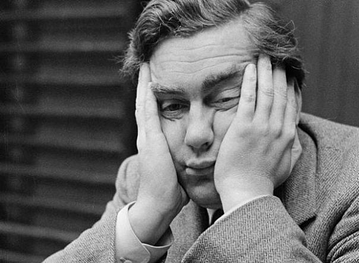 History is boring.
History is boring.
There I said it.
How many times have you heard that?
A lot of times, I would hazard to guess. We all have. History is boring.
Guess what?
Usually the people saying this are the ones who have never really been taught history by someone who knows what they are doing. Fact.
History is not boring. Fact.
Teachers who don't understand how to teach history can make history seem boring, but history itself is far from boring.
Do you think movies are boring? Or theatre? Or television? (well some of it is, heh,heh,heh)
All forms of dramatic entertainment are, on one level, descended from history.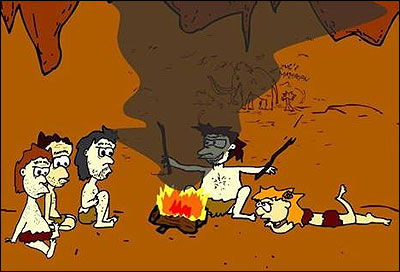
The very earliest forms of entertainment involved cavemen telling stories around the campfire at night, regaling their friends with tales of the recent hunt or battle. In other words, it was a someone telling “his story”.
History.
Every outrageous and exciting and amazing thing that has ever happened is part of history.
And for it to be “not boring” in presentation simply requires someone skilled enough to recognize the dramatic elements and to then tell the story with excitement and dramatic ability.
Storytelling.
That is what history is.
And history is important.
It is impossible to understand the present or the future without understanding the past.
So, we teach history to kids. Sometimes they are taught well and sometimes not. Even when they are taught well, their education can use a little reinforcement.
And so, we have school assemblies that teach history.
And, no, they are not boring. Or, rather, they are not boring when they are done well!
History assemblies for schools come in many flavors and forms.
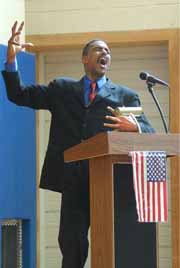 Sometimes the school show will take the form of a skilled actor impersonating a famous person from the past simply telling their own story. Presidents are always popular, along with other famous public figures, whether from politics, business or science. Depending upon where you live and on what you may or may not have access to, historical school shows may involve Abraham Lincoln or George Washington or Ben Franklin, Thomas Edison or Mark Twain, Martin Luther King or Frederick Douglass, Teddy Roosevelt or Thomas Jefferson. Representing the ladies you will find school shows about Harriet Tubman, Amelia Earhart, Florence Nightingale, Clara Barton and so on. And you will find hybrid shows where the performer takes on different characterizations throughout the show, switching costumes, accents and so on to differentiate between different people.
Sometimes the school show will take the form of a skilled actor impersonating a famous person from the past simply telling their own story. Presidents are always popular, along with other famous public figures, whether from politics, business or science. Depending upon where you live and on what you may or may not have access to, historical school shows may involve Abraham Lincoln or George Washington or Ben Franklin, Thomas Edison or Mark Twain, Martin Luther King or Frederick Douglass, Teddy Roosevelt or Thomas Jefferson. Representing the ladies you will find school shows about Harriet Tubman, Amelia Earhart, Florence Nightingale, Clara Barton and so on. And you will find hybrid shows where the performer takes on different characterizations throughout the show, switching costumes, accents and so on to differentiate between different people.
Regardless of the character, these programs can be amazingly compelling, and serve to really spark children's curiosity to learn more about the person or period.
In these types of programs, the show is usually an actor talking in character, but not always. Sometimes, music is added and the show becomes a mini musical theatre presentation. Lincoln singing about slavery, or Amelia singing about flying, and so on. Not my cup of tea, personally, but some schools love these.
In other school shows, the performer will be less an “actor” and more of an “interpreter”. If you have visited any good living history site you will understand what I mean. There will be a performer in the guise of a character from the past, and usually an unknown or fictional personage (an “everyman”), interpreting the events of that characters life and times. These programs are often the product of Civil War or Colonial War re-enactors, whose dramatic story telling skills may be less than those of true actors, but whose knowledge and enthusiasm is often more than sufficient to make up the difference. Topics will include Civil and Revolutionary periods, Native Americans, programs about local and state history, and a host of others.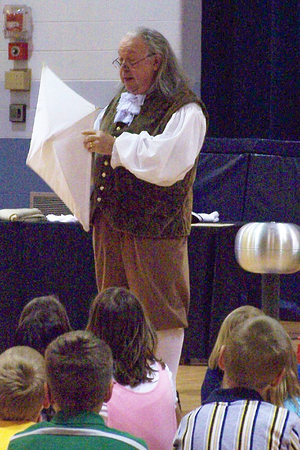
The majority of the school shows mentioned so far will be, usually, a man one or one woman show. But, occasionally, these programs are offered by a team, often a husband and wife, and usually portraying a married coupe, such as Abraham and Mary Lincoln.
And then there are theatrical productions that involve entire casts of several actors. But we will discuss these in a later offering on Children's Theatre Productions.
The thing to keep in mind is that school assemblies, spread through the year, offer opportunities to not only break up the humdrum, but also to support the curriculum. Science school shows are great for supporting the science curriculum. Historical shows are equally good at supporting the social studies curriculum.
Within this field, though, beware. Historical assemblies have traditionally provided a welcome source of income for struggling actors. In their wealth of creativity, these actors will produce countless shows about characters and people not necessarily relevant to your schools curriculum. Yes, a show about a 19th century Chinese railroad worker may sound interesting (or not) but is it the best use of resources when the kids are not studying that topic. You need to make that choice yourself.
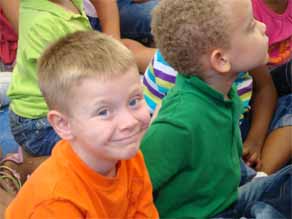 But, overall, mixing historical assemblies into a slate of other shows featuring science, art, music and character development, makes for a great schedule for the year.
But, overall, mixing historical assemblies into a slate of other shows featuring science, art, music and character development, makes for a great schedule for the year.
Don't forget your history!
Geoff Beauchamp is the Regional Manager of Mobile Ed Productions where "Education Through Entertainment" has been the guiding principal since 1979. Mobile Ed Productions produces and markets quality educational school assembly programs in the fields of science, history, writing, astronomy, natural science, mathematics, character issues and a variety of other curriculum based areas. In addition, Mr. Beauchamp is a professional actor with 30 years of experience in film, television and on stage. He created and still performs occasionally in Mobile Ed's THE LIVING LINCOLN. He also spent ten years coordinating assembly programs for the elementary school where his own children went to school.






